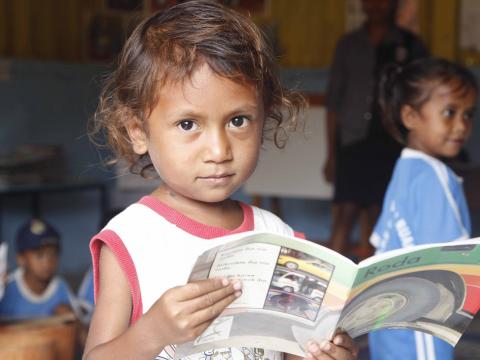Early childhood education helps children achieve life in all its fullness

Providing young children with opportunities for play, a safe environment, proper nutrition, education and a nurturing home life are crucial for their development and have long-lasting positive effects. The holistic nature of early childhood care and development addresses these essential elements that contribute to the physical, emotional, intellectual and social development of children aged up to six years. However, in Timor-Leste, just 15.5% of children aged 3 to 5 years are enrolled in pre-school .
To help address this gap, World Vision, with funding from the Department of Foreign Affairs and Trade’s Australian NGO Cooperation Program, established the second phase of the Early Childhood Care and Development (ECCD) project in Bobonaro, Timor-Leste in 2014. The first phase ran from 2008-2013. Phase two was completed in June 2017.
As part of phase two of the project, World Vision built five community-based ECCD centres in villages, which serve as community pre-schools, as well as establishing nine home-based ECCD centres run at community members’ houses in sub-villages.
Children enrolled in ECCD classes have the opporutnity to improve their literacy and numeracy skills as well as particpate in art classes including dance, painting and drawing. Photo: Jaime dos Reis/World Vision
Along with creating the centres, World Vision provided training to the ECCD teachers in the areas of literacy for young children and arts; numeracy through games and activities; and classroom management and activities. One of the ECCD teachers who was trained by World Vision, Francisca da Costa, shared, “This project has benefited us enormously since it has improved our skills and knowledge.”
ECCD teacher Francisca da Costa (left), shared, “This project has benefited us enormously since it has improved our skills and knowledge.” Photo: Jaime dos Reis/World Vision
The ECCD centres provided children with the opportunity to develop their literacy and mathematics skills as well participate in various art forms including dance, drawing, painting, role playing and music. ECCD centre student Janeta, aged 5, beamed when she said, “I come to school every day and learn counting, drawing and I play with my classmates.”
One of the key benefits for children enrolled in ECCD classes is they are better prepared for primary school. A school readiness test showed that around 75% of the children enrolled in ECCD classes were well prepared to enter primary school, based on their language, problem solving and motor skills, compared to around 35% of a group of children assessed in the area who were not enrolled in ECCD classes.
Primary school teacher Antonio Beto da Cruz said, "Children who were enrolled in ECCD classes are doing better than those who weren’t and their discipline is better. The presence of World Vision in our village has been great.” Primary school student Josefo, aged 9, who previously attended ECCD classes, shared, “We are learning material quickly at primary school because of what we learnt in pre-school."
Early childhood education helps better prepare children for primary school. Former ECCD student Josefo (fourth from left), aged 9, who previously attended ECCD classes, shared, “We are learning material quickly at primary school because of what we learnt in pre-school." Photo: Jaime dos Reis/World Vision
Another element of the project involved educating parents and caregivers to develop their ability to practice good parenting at home. Parenting sessions were conducted with farmer groups, at church gatherings, with mothers’ clubs and at the community-based ECCD centres. Parents also received ‘pasta aprende’ (learning pockets). The learning pockets contained books for literacy development, sticks for a numeracy activity, and number and alphabet cards. The project evaluation found that virtually all parents who received learning pockets provided development stimulation at home compared to less than half of a group of parents surveyed whose children were not enrolled in ECCD classes. As part of an activity at an ECCD centre, a young girl drew a house. When asked why she drew the house, she said, “I like my house now, because we have pasta aprende. Now my mother plays with me more and we learn together with the pasta aprende.”
Leohitu Village head, Administrative Post of Balibo, Benjamin Maia said, “World Vision’s work is very good. They provided training and support as well as learning materials.” Mr Maia said he is committed to cooperating with the Ministry of Education for Basic/Primary Education in Bobonaro Municipality to transform the Leohitu village ECCD centre into a public school now that this World Vision ECCD project has ended, as it has been accredited by the relevant ministry.
ECCD teacher Francisca said, "I am sad that the ECCD project is ending but I feel confident we will continue to teach the children well. I am very grateful to World Vision and we always welcome you when you want to visit.”
Over 2,200 children benefited from the Early Childhood Care and Development project in Bobonaro between October 2014 and June 2017.


